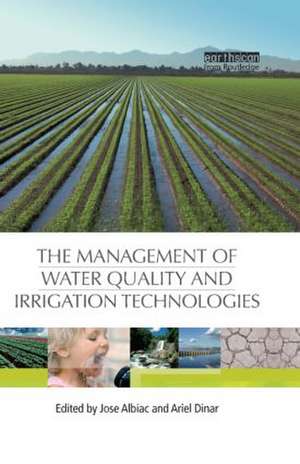The Management of Water Quality and Irrigation Technologies
Editat de Jose Albiac, Ariel Dinaren Limba Engleză Hardback – 16 dec 2008
Preț: 499.00 lei
Preț vechi: 689.43 lei
-28% Nou
Puncte Express: 749
Preț estimativ în valută:
95.50€ • 99.33$ • 78.84£
95.50€ • 99.33$ • 78.84£
Comandă specială
Livrare economică 24 martie-07 aprilie
Doresc să fiu notificat când acest titlu va fi disponibil:
Se trimite...
Preluare comenzi: 021 569.72.76
Specificații
ISBN-13: 9781844076703
ISBN-10: 1844076709
Pagini: 272
Dimensiuni: 156 x 234 x 23 mm
Greutate: 0.57 kg
Ediția:New.
Editura: Taylor & Francis
Colecția Routledge
Locul publicării:Oxford, United Kingdom
ISBN-10: 1844076709
Pagini: 272
Dimensiuni: 156 x 234 x 23 mm
Greutate: 0.57 kg
Ediția:New.
Editura: Taylor & Francis
Colecția Routledge
Locul publicării:Oxford, United Kingdom
Cuprins
Introduction * Part I: Non-point Source Pollution Regulation Approaches * Problems in Assessing Non-point Source Pollution in China: Links to Policy and Regulation * The Use by Decision Makers of Integrated Modelling, Research, and Monitoring to Control Pollution in the Chesapeake * Nonpoint Pollution Regulation Approaches in Spain * Nonpoint Pollution Regulation Approaches in the US * Non-point Pollution Control: Experience and Observations from Australia * Policies to Cope with Water Resources Scarcity and Quality Degradation in China * Part II: Irrigation Technology to Achieve Water Conservation * Irrigation Technology and Water Conservation in Jordan * Crop Water Use Information, Irrigation System Performance, and On-demand Water Delivery Systems: Three Essential Elements of On-farm Irrigation Efficiency and Conservation * Pricing Savings, Valuing Losses and Measuring Costs * Institutional Factors and Technology Adoption in Spanish Irrigated Agriculture: Effects on Water Consumption * The Effects of Water Markets, Water Institutions and Prices on the Adoption of Irrigation Technology * Index
Notă biografică
Jose Albiac is a Senior Researcher at the Agrifood Research and Technology Centre (CITA - Government of Aragon), Zaragoza, Spain. Ariel Dinar is Professor of Environmental Economics and Policy, and Director Water Science and Policy Center, University of California, Riverside, USA. He was formerly Lead Economist and Co-ordinator of Climate Change Research in the Development Research Group at the World Bank in Washington DC, USA. He is the author or editor of many books on water economics and natural resource issues, including Climate Change and Agriculture in Africa (Earthscan, 2008).
